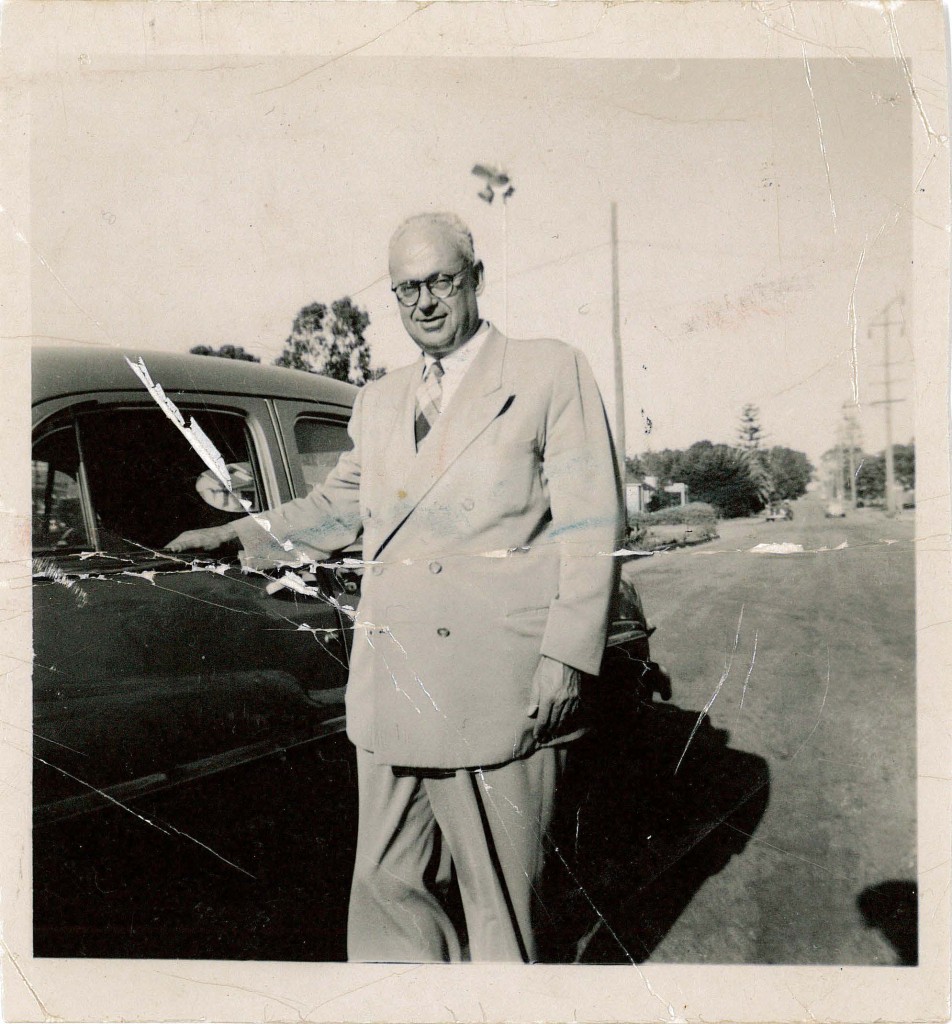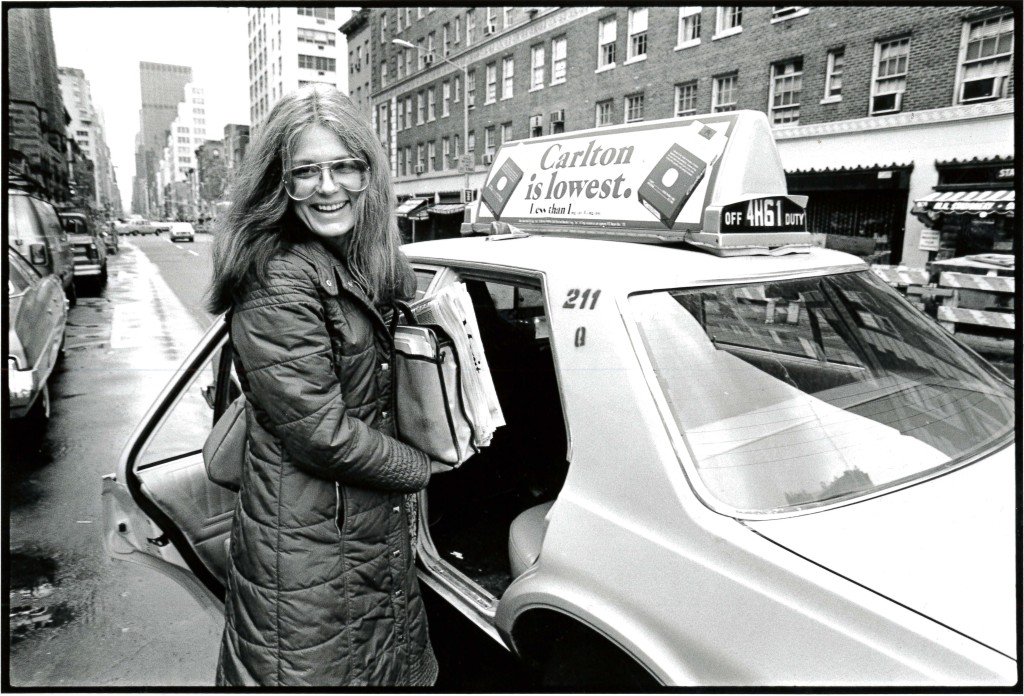Rico Gagliano: Each week you send in your questions about how to behave, and here to answer them this week is one of the past century’s foremost writers, scholars, and activists, Gloria Steinem.
She was a founding editor of the hugely popular feminist periodical Ms. Magazine. She has written several books, published and edited collections, and for the past 30 years she has traveled the world speaking, educating, and organizing around feminism and other causes.
Today, she is still considered one of the leaders of the women’s rights movement and she’s got a new memoir! It’s a recollection of her many travels. It’s called “My Life On The Road.” She’ll be talking about it with actor Melissa McCarthy at an upcoming event at The Theatre at the Ace Hotel in Los Angeles later this month.
Ms. Steinem, it’s an honor to have you.
Gloria Steinem: It’s great to be here. Thank you.
 Brendan Francis Newman: It was fun writing that introduction because we knew that we would just use Ms. Steinem. There was no question about how we would address you. So this book is a memoir, but I read somewhere that you didn’t like the word memoir because you thought it was elite.
Brendan Francis Newman: It was fun writing that introduction because we knew that we would just use Ms. Steinem. There was no question about how we would address you. So this book is a memoir, but I read somewhere that you didn’t like the word memoir because you thought it was elite.
Gloria Steinem: Yeah, and also when Jack Kerouac wrote a “road” book I don’t think they called it a memoir.
Brendan Francis Newman: All right. That’s true. So you wanted the same rights as Jack Kerouac?
Gloria Steinem: Well, I just sounded kind of hutsy-tutsy if you know what I mean. And also, although this is of course personal, it’s not love affair upon love affair. I don’t want people to be disappointed.
Rico Gagliano: I mean there are a few love affairs, but why did you decide on this title, then?
Gloria Steinem: Well actually, in the very beginning, and for many years, it was called “America, As If Everyone Mattered.” But because of the Black Lives Matter movement I thought, no at this moment in time that phrase belongs where it is. So this was actually the subtitle, “My Life On The Road” and now it’s the title.
Rico Gagliano: And you were going to call it “As If Everyone Matters.” Does that connect to the idea that you feel like America is much more diverse than politicians and other people think of it, and they don’t know that because they don’t spend time on the road?
Gloria Steinem: Yes, it’s that, and it’s also that we have hierarchies of all different kinds in this country and I find that travelling they begin to disappear if you listen to the talk or get off the beaten path. If you just listen, you discover that those hierarchies don’t mean too much, that your expectations are almost always wrong. So, I was going for a little kind of sarcasm, as if everyone mattered.
Rico Gagliano: And you speak from experience. You’ve been on the road from a very young age. You write that your father was an itinerant antiques dealer. Can you describe some of those early childhood experiences traveling?

Gloria Steinem: Well, we lived in southern Michigan where my father had a small summer resort, but he hated the cold weather. So as soon as it got chilly — and that was around Halloween or something — I would be removed from school and my sister, me, my parents, and several dogs, would pile into what were then quite small house trailers and begin our trek to Florida or California, which my father financed by buying and selling antiques and jewelry along the road, which he bought at auctions and so on.
I mean we never started out with enough money to get where we were going but somehow it always worked.
Brendan Francis Newnam: You were obviously a passenger, but your role as passenger continues. You still don’t drive. And you alluded to this a little bit earlier, but you talk about how that’s afforded you a different view on the world.
Gloria Steinem: Well, I try to explain that look if you don’t drive your adventure, your trip, begins the moment you leave your door. And that’s why I ended up telling a lot of taxi stories. I mean, I could tell subway stories too, but I thought taxis were more universal.
Rico Gagliano: Does one bit of taxi driver wisdom stand out for you?
Gloria Steinem: My best political advice half the time comes from taxi drivers.
Rico Gagliano: Oh really?
Gloria Steinem: Well, I remember right after 9/11 [in New York], we were kind of driving in silence we saw what turned out to be a very common graffiti, which nobody knows where it came from, but it was very moving — “Our grief is not a cry for war.”
And the taxi driver said to me, “You know, we feel this way because we were here and we saw the destruction. And the rest of the country, they feel guilty that they weren’t here and they’re going to want revenge.” I thought that was very wise.

Brendan Francis Newman: In the military they actually call that ground truth. There’s military intelligence that people gather, but ground truth is what the soldiers report back, like, “This is what’s really happening here.”
Gloria Steinem: So if I’d known that I could have called the book “Ground Truth.” [Laughs.]
Brendan Francis Newman: Well, maybe that could be your follow-up book.
Rico Gagliano: We get some royalties for that. Just beware.
Brendan Francis Newman: That’s right. So of course along with travelling around, you’ve been witness to many waves of feminism since you made this your life’s work. What’s the biggest way the movement changed from then to now?
Gloria Steinem: I think in the beginning it was all about consciousness because the idea of a role for women, a role for men, was just so ingrained that it was confused with human nature. And if you didn’t go along with it you were regarded as crazy.
So I think the first wave of consciousness was discovering that we weren’t crazy, the system was crazy and this is big. This is huge. Then we had to name issues.
I mean, say “domestic violence” didn’t exist as a phrase, it was just called life.There were no police procedures really. In the cases of domestic violence, police really counted success as getting the victim back with the victimizer. That was their idea of success.
So, in that and many other areas, listening to people’s experience, stating one’s own experience, naming issues, and beginning to change laws.
Rico Gagliano: What do you see as the state of feminism today? Because in a way it seems to me it’s more powerful than ever. It really does feel like change is in the air. But it also seems maybe less united as a movement. For example, I see a lot of disagreement right now about whether it’s feminist to be in favor of sex work as a choice for women. Do you think that’s accurate? Is it more fractured?
Gloria Steinem: You know, I don’t know because our perception of it may be so influenced by what we see on the web, which we didn’t have before. I think — in the case you mentioned, for instance I also called it “sex work” in the ’70s.
And then I ended up marching with the National Welfare Rights Organization in Nevada because the argument that it was work like any other was being used to force women into prostitution and off welfare. Off unemployment. And then I saw the same thing happening in Germany so I began to realize that calling it work like any other meant that people could be forced into it.
Rico Gagliano: So the idea was basically like, “Why are you on welfare when you can always be a sex worker?”
Gloria Steinem: Exactly, so you know
I never again called it “sex work” after that because it has consequences.
Brendan Francis Newman: So in a second we’re going to ask you to respond to our listeners’ kind of etiquette questions, but I wanted to ask you about one of the philosophies you discuss in your book. A life philosophy called, “Ask the Turtle.”
Gloria Steinem: Well, I, this happened to me a really long time ago when I was in college, but it took me a long time to realize that it was a lesson that could apply to life itself [laughs].
I took a geology course which I believe to be the only science I could…
Brendan Francis Newnam: …Handle?
Gloria Steinem: Handle [laughs], right. And we were looking at the Connecticut River valley, and I of course was paying no attention because I had wandered off a dirt road and found a gigantic mud turtle on the side of an asphalt road. It had crawled up, you know, from the river.
And I thought obviously this turtle was going to go up on the asphalt road and be crushed by a car. So I picked up this huge, snapping turtle and slowly managed to get it all the way back down the road and slipped it in the river. And as it was swimming away, the professor came up behind me and he said, “You know that turtle has probably spent maybe a month crawling up that road to lay its eggs in the earth on the side of that.” Right?
Rico Gagliano: Yeah, you destroyed its egg-laying process by accident.
Gloria Steinem: Yes, absolutely. I set it back a month. I mean, I felt terrible. But it took me living in India and coming to understand something about organizing to understand that that was a kind of life rule, “Always ask the turtle.”
Rico Gagliano: What it needs, basically.
Gloria Steinem: Yeah, people who are experiencing a problem are the ones who know the solution. And imposing it from way up above doesn’t usually work.
Rico Gagliano: Gloria, a lot of our listeners wrote in etiquette questions for you to answer. Are you ready for these?
Gloria Steinem: Yes. I would not say that I am regarded as overly polite [laughs].
Brendan Francis Newnam: Well, perfect. We’ve had everyone from Mel Brooks to heavy metal drummers answer these questions, so I’m sure you’ll do fine.
Gloria Steinem: [Laughing] OK, OK.
The best way to recover from a cultural faux pas
Rico Gagliano: Here’s something from Alexis in Los Angeles. Alexis writes: “Giving your book about traveling, have you ever made a faux pas in a different cultural setting, American or internationally? If so, how did you recover?”
Gloria Steinem: What that brings to mind is people’s varying ideas about what’s OK to reveal about themselves in different cultures. In England, you reveal nothing [laughs].
Rico Gagliano: That’s the polite thing to do is to never tell anybody anything.
Gloria Steinem: Yeah. You never tell anything, you discuss the weather, whatever. In India, it’s quite the opposite. People feel quite free to ask you…
Brendan Francis Newman: …very personal questions?
Gloria Steinem: Yeah, I mean maybe it has caste or class implications there, but you know on a train somebody will say to me, “Are you married?” Or “If not, why not? And, “What do your parents do? And why do Americans all carry guns?” And you know [laughs]. So the art form is not trying to change yourself at your core, but trying to figure out how to fit in to the… what’s OK.

Rico Gagliano: But the question is so, clearly you’ve experienced probably making a faux pas probably not knowing what the cultural rules were, but how do you get out of it?
Gloria Steinem: Well, you just say you’ve made a faux pas. You just have to say it.
Brendan Francis Newnam: Own it.
Gloria Steinem: You have to own it, yeah. Right. And if you own it, people are usually OK with it.
Brendan Francis Newman: So if you’re in Britain you say, “I’m sorry I asked you your name. Forgive me. I’ll just return to talking about the weather.”
Gloria Steinem: But the way I realized this is that, you know, people would say to me in London, “You know for 40 years we’ve been wondering why that man wears one black show and one green shoe. Perhaps… you’re an American, you can ask anything.”
Brendan Francis Newman: They put you up to it [laughs].
Rico Gagliano: You were doing them a service!
Turning the sexist tables
Brendan Francis Newman: Maybe all these questions are secretly submitted from British people trying to have Americans give them the answers. All right, our next question comes from Sarah. She says she’s from North Bergen, New Jersey and she writes: “What is the best way to respond to people, usually men, who command me to smile and ‘be happy’? I’m assuming blind rage is not polite.”
Rico Gagliano: That’s true, Sarah.
Gloria Steinem: You know it is outrageous because it is so gendered, that idea. I mean I don’t think that women say to men, “Why don’t you smile?” And the most routinized form of it, that I’ve encountered, is flight attendants, who used to complain to me — it may be slightly better now I don’t know — but they would say even my face is not my own. I’m supposed to smile all the time and they were… you know, very stringent rules as to-
Rico Gagliano: Oh I can tell ya, they’re not following that rule that much anymore on flights, from my experience.
Gloria Steinem: Yeah, but I think
I would either just ignore it or say, “Would you say that to a man?”
Rico Gagliano: On the other hand, that’s kind of your job though is to confront people. Is that the thing to do when you’ve just met somebody at a party?
Gloria Steinem: Well, I think it’s all of our jobs to not do it in a hostile way, but do it in an authentic way.
Brendan Francis Newman: You’ve talked about, in the book you discuss that people call you a name just to say thank you in a way, just to kind of jam their radar.
Gloria Steinem: Yeah, well that’s… and women do say to me, you know, what if somebody calls them a bitch or something, you know, what to do? And the best thing I found so far is just to say, “Thank you.”
Brendan Francis Newman: Take the power away from that word.
Father-in-laws and Facebook
Rico Gagliano: Here’s a question from Hannah in Somerville, Massachusetts. And she writes: “First of all, Ms. Steinem, you’re incredible.” [Laughs.] That’s what Hannah says.
Brendan Francis Newman: Hey, there you go. That was very polite of her. She doesn’t need our advice!
Rico Gagliano: You can say thank you very happily to that. “My question,” she says, “when my partner posts on Facebook about feminist issues — OK all issues — my conservative father-in-law often adds his own take there. At length. When we don’t respond to him he assumes he’s either won an argument or that we’re mad at him. When we do respond, he takes it personally and pouts. How do we handle this situation? We’ve talked with him about this before, but I don’t think he gets how social networking works.”
Gloria Steinem: Well, I guess you could just put after what his response is, “That’s my father-in-law!” [Everyone laughs.]
Rico Gagliano: …For ya.
Brendan Francis Newman: With an exclamation point.
Gloria Steinem: Yeah, right.
Brendan Francis Newman: Actually, isn’t that insulting? ‘Cause I have a brother-in-law that has a different feeling about guns than I do and I think if I said, “That’s my brother-in-law” he would proudly be like, “Yes! This is my opinion.”
Gloria Steinem: I mean I could give a longer answer. Dorothy Dinnerstein, a brilliant writer, always said that there were two functions of family: one is obviously sustenance and also to learn what different age stages are like. And the second is to learn how to get along with and even love people that you disagree with. That that’s really important for the future of the human race.
Otherwise, in the rest of our lives we pick people we share interests and values with. So, I thought to myself, “That’s brilliant!” You know, why didn’t somebody say that to us in the first place? Because the prison is when you think you’re supposed to agree with your blood relatives. But if you see it as a useful exercise for everybody to learn-
Brendan Francis Newman: It’s like a laboratory.
Gloria Steinem: Yeah. To learn how to get along with and negotiate with and tell the truth with and love, you know, and appreciate people you don’t agree with.
Brendan Francis Newman: Yeah. Well there you go, Hannah.
Rico Gagliano: That’s the most proactive way I’ve ever heard of describing what Facebook can do.
Brendan Francis Newman: Or also how to survive Thanksgiving.
Gloria Steinem: It’s a little long.
Rico Gagliano: In fact, that was the exact right length of answer because we are out of time. Gloria Steinem, thank you so much for answering our audiences questions.
Gloria Steinem: Well, yes. But I am completely open to other people’s responses [laughs].


